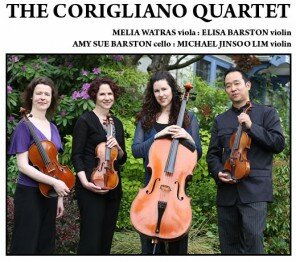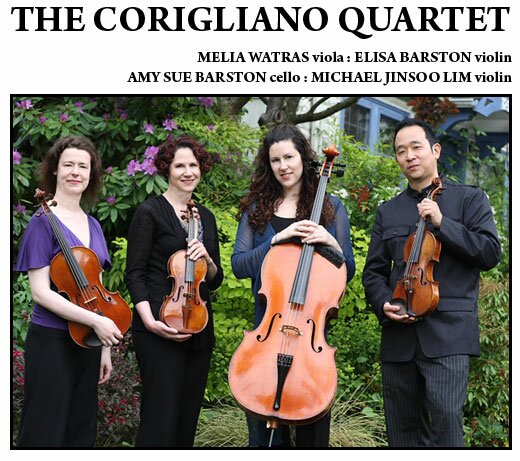
The SunBreak’s Constant Readers know we are huge fans of the Cornish Music Series. As a college of the arts, Cornish has a seemingly endless list of performers, some in house and some in as artists-in-residence, to showcase on the PONCHO Concert Hall stage. Certainly, the list of performances is usually varied in the extreme. But, to our ears, the results have never been less than fascinating and are often an exuberant revelation.
Saturday’s performance by the Corigliano Quartet was definitely the latter. Three glorious selections played with dash and and professional élan added up to a great night of music. Next up in chamber music, on April 14, is pianist Cristina Valdes, playing contemporary music by Latin American composers. Tickets are $20 adults, $10 students.
One of the best aspects of the Cornish Series is the informally academic atmosphere. Performers usually take a moment to introduce each piece, sometimes punctuating the introductions with wit and humor. Such was the case on Saturday. The Quartet took the stage and violinist Michael Jinsoo Lim took a moment to explain how the ensemble was first formed.
Lim self-effacingly explained that, while in school in Indiana, he was approached by the music department to have his quartet perform a work by composer John Corigliano as part of a modern music festival. Lim accepted, even though he didn’t actually have a quartet. He quickly found some like-minded friends and formed the Corigliano Quartet.
Saturday’s concert opened with a short John Corigliano work, A Black November Turkey, arranged especially for the eponymous quartet and played by them with unusual gusto. It was an aural equivalent of an amuse-bouche, a tasty nugget to wet the appetite for the feast to come.
Cellist Amy Sue Barston introduced the next work, Beethoven’s landmark String Quartet in E-Flat Major, Op. 74. It was a cagey choice because, in this work, Beethoven foregrounded pizzicato, a rhythmic plucking of the strings, as a new musical technique, a way to bring new sounds to concert performances. In fact, this piece is often called the “Harp” Quartet because of its innovative use of plucking.
Modern composers, including Corigliano, seized on this technique over the last century to create unusual, progressive and discordant music, but even they acknowledge that the master beat them to the punch two hundred years earlier.
The Corigliano Quartet’s performance of Op. 74 was masterful; they simply played it better than I’ve ever heard it before.
Perhaps it was the college setting that fired the Quartet’s performance. Violinists Lim and Elisa Barston, violist Melia Watras and cellist Barston couldn’t keep the smiles off their faces and you could see them encouraging each other to take it further. It’s only April, but it’s already my classical performance of the year.
After a brief intermission, the Quartet finished with a performance of Corigliano’s String Quartet (1995), one of the composer’s major works. Watras introduced the song’s origins: it was written to honor the final performance of the Cleveland Quartet.
The work starts, as Watras explained, with quiet tones and then builds with a rousing scherzo movement; a quiet, mature nocturne; a strange, oddly moving fugue; and ends with a restatement of the opening, quiet tones. It was a work to throw in the face of those that say great string quartet composition ended in the 1800s.
It’s a long work, but the Corigliano Quartet was up to it. Again, it was a strong, emotional musical performance and my guest and I walked out of the hall feeling light as air. The only downside was the small crowd–about 50 enthusiastic music lovers–which means most of you were missing it.
As Archer would say, What the hell is wrong with you people?
The Cornish Music Series has two more performances this year. The cost is right and there are multiple choices for great dining within walking distance. On Saturday night, my guest and I dined at Poppy before the show–and, for good measure, sat right next to Edward James Olmos, in town for Comicon. Your dinner guests may vary.
